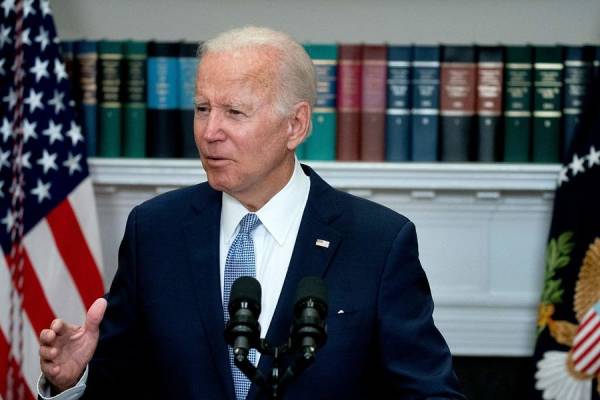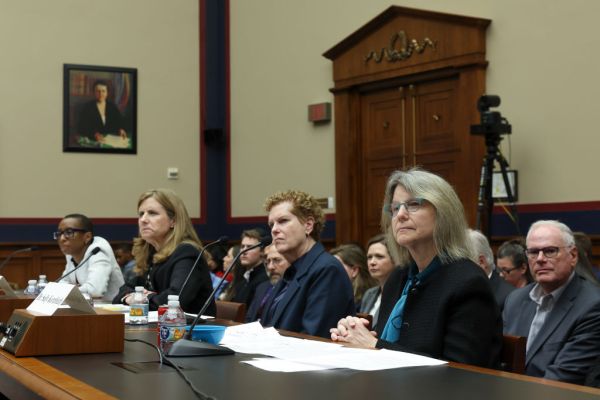The Biden administration recently published a comprehensive Title IX rule that constricts due process protections for students accused of sexual misconduct and reinterprets sex discrimination to reach sexual orientation and gender identity discrimination. Many in the media have portrayed the controversy over this rule as a conflict between cultural conservatives and progressives.
That story is true, but there is another story as well. It demonstrates how, as Congress weakened, the administrative state grew stronger over the last century and fanned the flames of cultural conflict.
And it may yet become a story about the importance of constitutional doctrines that protect individual liberty by limiting the powers of the administrative state. The nondelegation doctrine and the major questions doctrine are two legal principles that can both serve as swords against an overreaching civil rights bureaucracy.
How the new Title IX rule harms individual liberty.
Title IX of the Education Amendments of 1972 prohibits sex discrimination by federal funding recipients. The Congress that enacted it was mainly concerned with opening up academic and professional opportunities to women who had been excluded from them for no reason other than sex. It was not concerned with preventing sexual misconduct on campus—many more colleges were single-sex than are today, and others still observed strict rules limiting male and female interaction. Many of these rules seem paternalistic or silly by 2024 standards, but they did limit opportunities for sexual misconduct.
Neither was Congress in 1972 really concerned with sexual orientation and gender identity as we think about them today. It is hard to understate how different public opinion about sexual orientation issues was in the 1970s compared with today. For example, an initiative to ban gay teachers in public schools made it onto the ballot in liberal California in 1978 but failed in large part because Ronald Reagan spoke out against it.
President Biden campaigned on promises that he would repeal the DeVos Title IX rule, and he has delivered. Unfortunately, the new rule restores much of the problematic Obama guidance that deprived students of due process.
Similarly, the concept of having a gender identity different from biological sex scarcely existed. The word “transgender” did not appear in dictionaries or news articles from this time; the word did not appear in the New York Times until 1986. Reasonable people can and do have different views on sexual orientation and gender identity discrimination. But whatever the right legal and policy answers are, it is implausible that Congress intended to settle them definitively in 1972. And that is relevant to the separation of powers doctrines that could apply to coming legal challenges.
In the 1980s, the Supreme Court interpreted Title IX’s statutory cousin—Title VII of the Civil Rights Act of 1964, which prohibits sex and other forms of discrimination in employment—to outlaw sexual harassment at work. A few years later, the Supreme Court interpreted Title IX to also ban sexual harassment by funding recipients when “a funding recipient acts with deliberate indifference” to known acts of harassment when it is “so severe, pervasive, and objectively offensive that it effectively bars the victim's access to an educational opportunity or benefit.” In 2001, the Department of Education implemented this ruling with detailed guidance, elaborating on how schools should enforce this prohibition.
Title IX was always a strange reed to support a comprehensive regulatory regime on sexual misconduct. Imagine asking 1,000 Americans unfamiliar with Title IX’s intricacies why sexual misconduct is wrong. Nearly all would speak about the importance of values like consent and autonomy. Very few would say anything about sexual harassment being wrong because it can prevent victims from accessing educational or professional opportunities. Indeed, some scholars have suggested that sexual harassment is better addressed by tort law that allows victims to seek redress from individual wrongdoers.
A bit over a decade after the 2001 guidance, the Obama administration issued new sexual harassment guidance—via a “Dear Colleague” letter that skirted the normal rulemaking process and went beyond the 2000 document. Critics charged that it created due process problems for accused students and would lead to infringements of First Amendment rights. In 2020, following a formal rulemaking process, President Trump’s Education Secretary Betsy DeVos issued a rule that corrected many of these problems.
President Biden campaigned on promises that he would repeal the DeVos Title IX rule, and he has delivered. Unfortunately, the new rule restores much of the problematic Obama guidance that deprived students of due process: It eliminates the rights of student respondents in sexual misconduct cases to live hearings, to inspect evidence against them, and to have counsel present. Schools may use a single investigator to serve essentially as both a prosecutor and judge in Title IX cases and they can launch Title IX investigations without a formal written complaint.
Those Obama-era due process deficits had a real-world impact. The Foundation for Individual Rights and Expression counted more than 600 lawsuits by students accused of sexual misconduct under these rules. The tale of “Brandon” at a community college in California, recounted by progressive attorney and advocate Alexandra Brodsky, is typical. He was found responsible for sexual assault based on the findings of a single investigator without a hearing. Although Brodsky has dedicated her career to helping victims of sexual misconduct, she described being “genuinely shocked by its lack of detail and level of analysis.” Eventually “Brandon” cleared his name, but only after hiring a lawyer at his personal expense.
The rule also defines “hostile environment harassment” broadly, departing from the Supreme Court’s holding that harassment must be “severe and pervasive” to “severe or pervasive.” Because sexual harassment law as it pertains to schools and workplaces has been interpreted to reach at least some pure speech (as well as expressive conduct), there is a long-recognized tension between the First Amendment and Title IX’s prohibition on harassment. Although the Supreme Court has never definitively spoken on this issue, the requirement that harassment be “severe, persuasive, and objectively offensive” is, as the Department of Education found when promulgating the 2020 amendments, a critical safeguard ensuring that harassment law “comports with First Amendment protections.”
Abundant anecdotes, going back decades, indicate that funding recipients have often cracked down on protected speech to avoid hostile environment liability. Take, for example, the plight of Laura Kipnis, a film and gender studies professor at Northwestern University. She published an essay in The Chronicle of Higher Education called “Sexual Paranoia Strikes Academe,” claiming that, “In the post-Title IX landscape, sexual panic rules” and that if “you wanted to produce a pacified, cowering citizenry, this would be the method.” Although such speech is protected by the First Amendment, Kipnis underwent multiple Title IX investigations that dragged out for months before she was finally cleared of wrongdoing. A Yale University undergraduate faced a Title IX investigation because of a paper he wrote criticizing Plato’s tripartite theory of the soul.
The Biden rule also interprets Title IX to cover sexual orientation and gender identity discrimination. It relies on Bostock v. Clayton County, a Title VII employment discrimination case, which held that an employer who fires an individual merely for being gay or transgender violates Title VII because “sex plays a necessary and undisguisable role” in such situations. Although Bostock explicitly reserved questions about accommodations for transgender students regarding “sex-segregated bathrooms, locker rooms, and dress codes,” the Title IX rule basically requires funding recipients to grant these accommodations.
Because the new rule expressly applies Title IX for the first time to sexual orientation and gender identity, potential for First Amendment violations increases. Some universities have already failed to uphold First Amendment principles to controversial speech in this area. For example, Michael Stannard, a professor in California’s State Center Community College District, faced an investigation because he said that “studies showed children do better if they are raised by both biological parents.” Another California community college professor and Stannard’s co-plaintiff, David Richardson, faced a Title IX investigation because he satirically listed “Do-Re-Mi” as his pronouns on his Zoom profile.
Concerning as all these developments are, separation of powers principles can protect individuals from the Department of Education’s overreach. Two examples are the nondelegation and major questions doctrines.
How the nondelegation doctrine can protect individual liberty.
The Constitution vests all legislative power in Congress. Agencies that enforce laws will inevitably fill in some minor gaps left by the legislature, but this gap-filling authority does not allow agencies to invent new rights or duties only vaguely hinted at by authorizing statutes. If a statute really is broad enough to grant an agency power to make up new obligations, then Congress has improperly delegated its legislative authority (what is known as the nondelegation doctrine).
The Constitution’s framers believed that a republic—a government of the people—would be more likely to enact just laws than a regime administered by a ruling class of ministers. Not only should all power be derived from the people, as James Madison wrote in Federalist No. 37, but that those entrusted with it should ultimately be kept “in dependence on the people.”
The nondelegation doctrine protects individual liberty by prohibiting Congress from delegating its lawmaking authority to administrative agencies. It requires that Congress must lay down an “intelligible principle” to which regulated parties must conform. If a law is so vague that it does not lay down an intelligible principle and essentially gives an agency a blank check, then Congress has unlawfully delegated its power.
The nondelegation doctrine’s finest moment came in the 1930s, when the Supreme Court struck down two New Deal regulatory codes as violations. But it is far from dead. In Gundy v. United States (2019), all justices agreed that the nondelegation doctrine would apply if the statute at issue gave the Department of Justice the “unguided” and “unchecked” authority that petitioner Gundy said it did. Gundy lost ultimately because a plurality of justices interpreted the statute to give the Department of Justice more limited authority. In other words, the justices disagreed on how to read this particular law, but not on the background separation of powers principles that apply to grants of virtually unlimited authority.
Does Title IX pose nondelegation problems? Reading “sex” broadly enough to encompass gender identity and sexual orientation, as Oklahoma’s lawsuit challenging the rule claims, would significantly shift lawmaking power away from Congress to the Department of Education. It would also likely (further) limit speech and expression. Applying nondelegation here will help safeguard individual rights from administrative power grabs.
The major questions doctrine and Title IX.
The major questions doctrine evolved in response to the problem of agencies asserting highly consequential power beyond what Congress could reasonably be understood to have granted. A major question is present when an agency purports to discover an “unheralded power representing a transformative expansion in its regulatory authority in the vague language of a long-extant statute.”
When a statute authorizes a federal agency to act, an important interpretive question is: Did Congress authorize that agency to act? In some such cases, the history and breadth of the authority that the agency has asserted and the assertion’s economic and political significance provide a reason to hesitate before concluding that Congress intended to confer such authority.
Agencies have only those powers given to them by Congress, and enabling legislation is, as the Supreme Court has put it, “generally not an open book to which an agency can add pages and change the plot line.” Or, said another way: “Congress generally does not hide elephants in mouseholes.”
Like the nondelegation doctrine, the major questions doctrine protects individual liberty. Requiring Congress to speak clearly when legislating on questions of economic and political significance prevents agency overreach and the incursions on individual freedom that come from agencies overreaching.
Does the new Title IX rule speak to major questions? For decades, Title IX was understood not interpreted to cover sexual orientation or gender identity discrimination; OCR first mentioned the possibility obliquely in a 2010 guidance on harassment. It did not fully articulate this policy position for a few more years, in an informal 2014 Questions and Answers document and in a 2015 letter to a transgender advocate. When a new presidential administration arrived in 2017, it changed course and stopped interpreting Title IX to cover these forms of discrimination. This history suggests a major question is present.
The rule is also politically significant. State and local legislation about sexual orientation and gender identity questions has been controversial and hotly debated across the country. It is hard to see how a federal rule requiring funding recipients to treat individuals in line with their gender identity could be viewed as politically insignificant.
Swords against agency overreach.
The Department of Education’s new Title IX rule poses numerous potential problems for individual freedom. It will deny due process to students accused of sexual misconduct and will also harm free speech and expression on campus. That the rule now extends to sexual orientation and gender identity discrimination will only compound the already extant tension between Title IX sexual harassment law and the First Amendment.
But the separation of powers doctrines that exist to protect individual liberty may serve as swords against agency overreach. Multiple lawsuits have already been filed on these grounds; if they are successful, they can protect student freedoms from Department of Education bureaucrats.
Reasonable people can and do have different opinions on how to respond to sexual misconduct and sexual orientation and gender identity discrimination. But it’s not the Department of Education’s job to settle these debates unilaterally. The Constitution requires that these issues be decided within Congress, our most democratic branch.






Please note that we at The Dispatch hold ourselves, our work, and our commenters to a higher standard than other places on the internet. We welcome comments that foster genuine debate or discussion—including comments critical of us or our work—but responses that include ad hominem attacks on fellow Dispatch members or are intended to stoke fear and anger may be moderated.
With your membership, you only have the ability to comment on The Morning Dispatch articles. Consider upgrading to join the conversation everywhere.